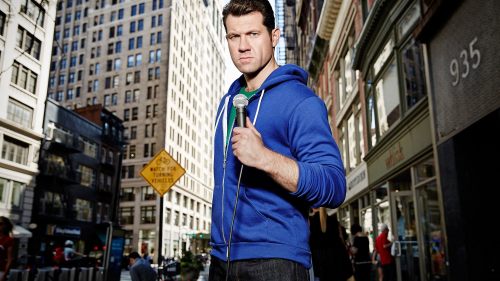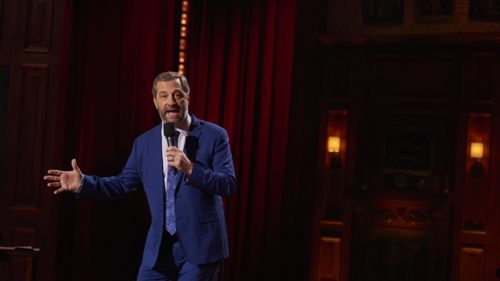Now We’re Blaming NEIGHBORS For The UCSB Shooting?
Misogyny played a huge role in the UCSB shooting last week. Shooter Elliot Rodger explicitly said so in his manifesto and YouTube diaries. We live in a culture soaked in misogyny; sometimes that misogyny is overt - see Girls Gone Wild - and sometimes it's covert - see the fact that women make up 15% of cinema protaganists while making up 51% of the population. It's vital to examine the world in which we live and critique it so that we can fix it. It doesn't do anybody any good to pretend like we don't have gender problems in this country, and to ignore that those gender problems are inherently skewed against women.
Ann Hornaday raised a kerfuffle this weekend with an article that attempted to draw a connection between UCSB shooer Elliot Rodger's virulent misogyny and the films of Judd Apatow (and friends). Says Hornaday:
Rodger’s rampage may be a function of his own profound distress, but it also shows how a sexist movie monoculture can be toxic for women and men alike.
How many students watch outsized frat-boy fantasies like “Neighbors” and feel, as Rodger did, unjustly shut out of college life that should be full of “sex and fun and pleasure”? How many men, raised on a steady diet of Judd Apatow comedies in which the shlubby arrested adolescent always gets the girl, find that those happy endings constantly elude them and conclude, “It’s not fair”?
Her quotes are, of course, taken from Rodger's videos.
I can get behind some of what Hornaday is saying. Yes, we have a cultural problem, and she addresses that problem in the final paragraphs of her piece - it's a problem of underrepresentation and misrepresentation and having women play the role of being a prize, not a human - but her examples are... well, they're super weird. And more importantly, super wrong. Neighbors in particular is a bizarre example to use, one whose only real bearing on the shooting is that it features a college party lifestyle. If Hornaday hadn't reviewed Neighbors I would actually doubt she had seen it at all.
Neighbors is about a young couple with a new baby and their struggle with a frat that moves in next door to them. The comedy from the film is derived from the idea that this couple, entering the most serious phase of adulthood - being parents! - don't want to let go of their youthful party lifestyle. At first they try to be cool with the frat but quickly the relationship goes sour, escalating into a series of back and forth pranks and attacks that spiral out of control.
There are two things that are notable about Neighbors: while the frat is presented as a sexualized group of young men - they sell dildos modeled on their own cocks at a fundraiser - the movie is largely devoid of objectified women. There's room to discuss the way that Zac Efron's girlfriend is used as a pawn to sow chaos within the house, but I think the film approaches it from a surprisingly complex and emotionally honest place. What's more - and this is the second notable thing - that chaos is sown by Rose Byrne, playing a character who not only isn't a harridan wife, but who verbally rejects that role in the story. Saying that Neighbors is some sort of feminist step forward is silly, but it's also reductive to ignore the more progressive aspects of the film's gender politics. Namely the women get to be just as dumb and immature as the men.
The thematic arc of Neighbors is about Seth Rogen and Byrne figuring out that they'd rather miss the party and get a good night's sleep, surely not the "frat-boy fantasy" that Hornaday sees in the film. Of course the parties do seem fun (until they turn nightmarish) but this is something with which all storytelling wrestles: the being bad stuff always comes across as more fun than the being good stuff. Staying home will never look as fun on film as partying does. Non-violence will never look as fun as violence. Monogomy will never look as good as fooling around. Even when the story is about revealing the negative side of these things, the scenes where the bad stuff is happening will always look appealing. Breaking Bad isn't pro-meth but, man, sometimes you get a real rush when Walter White pulls off a new villain move.
Do Judd Apatow's movies present unrealistic expectations for schlubby men? Maybe, but the works of Jane Austen do the same for certain sorts of women. Fiction will always show us a better world than the one we're in; even when fiction shows us a bad world there's an aspirational quality to how the protagonists deal with it. That's part of the magic of fiction. And it's also part of the problem - yes, entire generations have been raised with unreal expectations of romance and connection, but this isn't new. It's been happening for centuries now, ever since the idea of romantic love infiltrated literature.
Hornaday's confused arguments do her own thesis a disservice. Yes, there is a casual misogyny problem in our culture and it is reflected - and exacerbated - by our cinema. But just naming a single 'bro-ish' movie doesn't prove that thesis. Naming a 'bro-ish' movie that actually addresses some of these cultural elements is especially wrong-headed and pointless. Saying that movies create unrealistic expectations for anyone is also silly - yes, they do, and those unrealistic expectations help some of us get out of bed in the morning. Maybe today is the day you're going to meet (and crack) your Mr. Darcy, after all.
Life never works out as well as it does in the movies. That's why we go to the movies, Ann.



